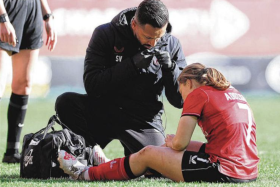Platform to help doctors share knowledge and case studies
Docquity has thousands of doctors signed on from M'sia, Indonesia, Philippines
In 2011, Mr Indranil Roychowdhury, now 40 and working in product development technology, was told by a senior cardiologist that his father would not have long to live.
His father had heart failure and his kidney was also not functioning properly. Water was getting choked in his lungs and causing him shortness of breath.
A junior doctor said he had heard of a similar case and gave him a call. He gave an alternative way to stabilise the father's condition. That second opinion helped his father live for six more years, enough to see his grandchildren grow.
Inspired by that experience, Mr Roychowdhury co-founded a platform called Docquity, for doctors to share medical knowledge and discuss case studies.
He said Docquity will "replace that phone call" and allow doctors to share their experiences with other verified doctors. The knowledge from such discussions will be available for other doctors to reference.
Launched in 2016, Docquity now has more than 60,000 doctors signed onto the app from Malaysia, Indonesia and the Philippines. It also has an index of over 70,000 clinical cases, with five to seven separate discussions around each case.
Mr Roychowdhury said he is working with medical associations to launch the apps in other South-east Asian countries, including Singapore by the end of the year.
He told The New Paper: "It was the second doctor who saved my father's life, but that phone call he gave me was never recorded or made available to other doctors. With Docquity, doctors will be able to 'crowdsource' information from fellow professionals."
Docquity allows doctors to discuss cases, with full patient anonymity. They are able to give opinions on different issues and help to find solutions across various specialisations.
Mr Roychowdhury added: "Doctors are specialised in certain areas, but patients have conditions that cross categories, so the doctors have to collaborate with one another. It is about helping doctors make informed decisions for their patients."
He also said it is a "private and secure learning platform". The doctors registered on the platform are all verified by the medical associations of that country.
Docquity also has medical courses that doctors can take and earn credits for continuous learning. The platform can even help share medical trends from one country to another.
Mr Roychowdhury said: "There are certain common illnesses that people from this region share. For instance, if we see many cases of a type of flu in one country, doctors in nearby areas can be aware of it and help people understand and be prepared."
Dr Prem Pillay, one of the advisers testing out the platform for use in Singapore, said the concept is a good one. He has been a neurosurgeon for around 25 years and operates at Mount Elizabeth Medical Centre.
He said: "It is a powerful knowledge-sharing site for doctors. I myself give talks but at most, I can reach only 200 to 300 doctors a year. Online, I can share with thousands of doctors and they can give instantaneous feedback."
Dr Prem also said the app can allow him to discuss the latest advances on treating back pain, for example, with other surgeons. He can also keep up to date with new medical advances in other fields.
He added: "In the future, the next step will be augmented reality, virtual reality and videos that help doctors see how an operation is done, for instance. Because this is a secure site, it is not the same as YouTube. It is about making medical education richer and deeper."
Get The New Paper on your phone with the free TNP app. Download from the Apple App Store or Google Play Store now


